If you were holding out hope that 2025 would be the year Google said, “You know what? Let’s give AI a break,” you might find this year’s GML very disappointing.
The script read like a love letter to artificial intelligence - again. Thomas Eccel summed it up beautifully:
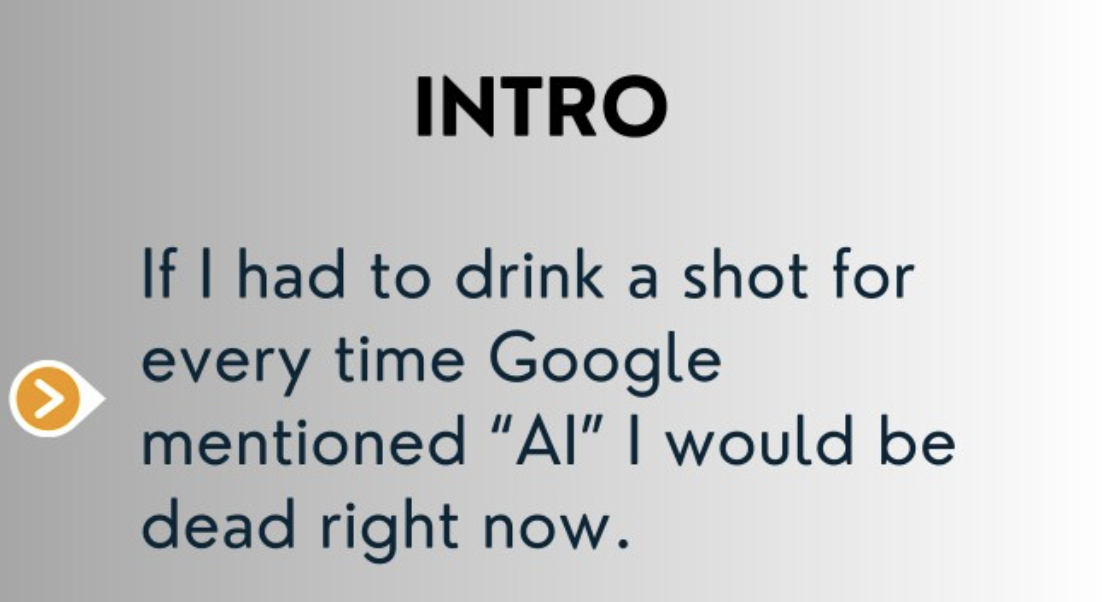
This year, Google made their intentions with AI clear - it’s not just an assistant anymore. It’s a marketer, a designer, and a strategist.
You can watch the full event above - but if you don’t want to listen to almost an hour and a half of Google gushing over its AI capabilities, here’s a recap of all the key features - and what some of the best marketers in the business are saying about them.
Google is expanding ads in AI Overviews & AI Mode to desktop
This is a big one. Google’s now slipping Search and Shopping ads directly into AI Overviews on desktop (starting in the U.S.).
That means your ads could show up before users even hit the organic results - prime real estate, no extra setup required.
We knew this was on the horizon for a while - and with AI overviews driving down CTRs on both paid and organic search traffic, Google likely knew they had to work fast to get ads into AI overviews.
If you’re running Performance Max, Shopping, or broad match Search campaigns, you’re already in.
Ads are also appearing in AI Mode (Google’s experimental new search experience), giving brands a shot at influencing decisions early in the search journey - before buyers even know what they’re buying.
In the GML presentation, Vidhya Srinivasan, VP/GM of Advertising & Commerce at Google, justified AI mode ads by stating:
“Search behavior is evolving. In AI Mode, users aren’t just searching, they’re briefing. 2-3x longer queries point to growing trust in search to handle complexity.”
What marketers are saying about ads in AI Overviews / AI Mode:
In his GML recap post, paid search expert Scott Carruthers, like many of us, wasn’t surprised by the announcement:

In his post, Chris Nightingale was just happy that Google is finally monetising the space:

Eyal Kaplan is optimistic about ads in AI Overviews / AI Mode, stating in a post that it offers ‘unprecedented opportunities’:

It’s discovery-mode advertising with algorithmic flair - and it’s a clear move by Google to monetise its AI layer without making users scroll too far. Helpful? While AI overviews are on top, definitely. Creepy? Only if you forget it’s all still pay-to-play.
New smart bidding exploration
This is supposedly Google’s ‘biggest bidding update in over 10 years’.
Google’s new Smart Bidding Exploration taps into AI to uncover high-performing search queries you’ve likely been missing. So less “exact match tunnel vision” and more “strategic curiosity.”
With flexible ROAS targets, your campaigns can now reach broader, research-phase queries - like “best laptops for remote work” instead of just “buy MacBook Pro.” In theory: More reach, same strategy, better results.
Google themselves are saying that ‘campaigns using Smart Bidding Exploration see an average of 18% increase in unique search query categories with conversions and a 19% increase in overall conversions’ - so definitely one to keep an eye on.
What marketers are saying about smart bidding exploration:
Carl Carter stated in his post that, with smart bidding exploration, AI handles the ‘how’ - marketers now need to master the ‘what’ and the ‘why’:
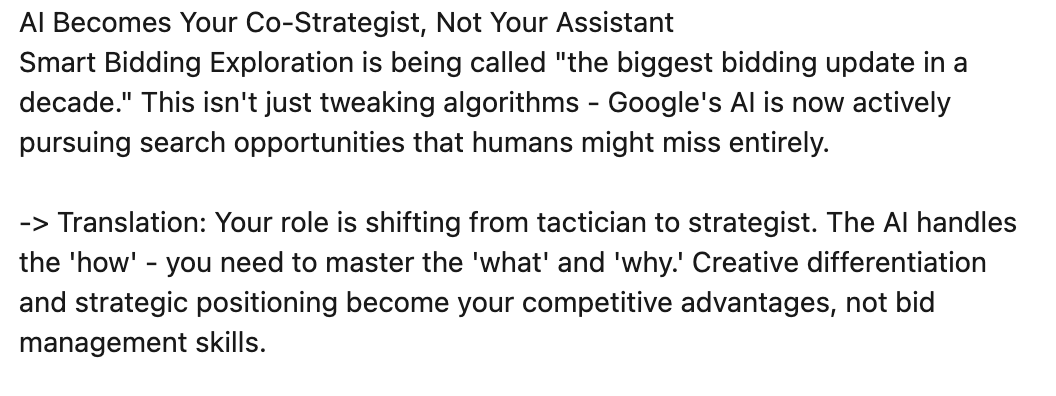
Kasia Niavinskaya called smart bidding exploration a ‘game changer for reaching untapped audiences’ in her post:

Tiedot founder Ben Williams called it ‘another complex addition to the glossary’ in his highlight post:
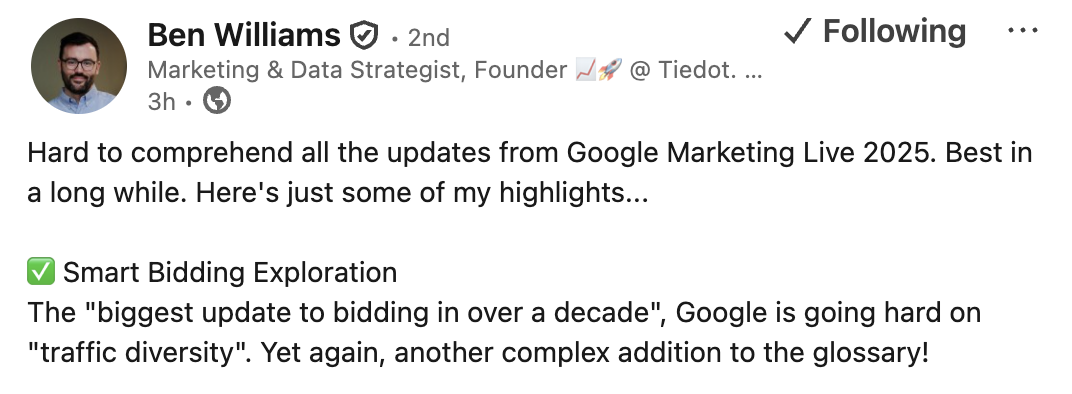
Digital Marketing Analyst Scott Cairns wrote a lengthy post on smart bidding, stating that ‘advertisers brave enough to test this will unlock competitive advantages their competitors are too scared to pursue’. We’d highly recommend reading Scott’s entire post:
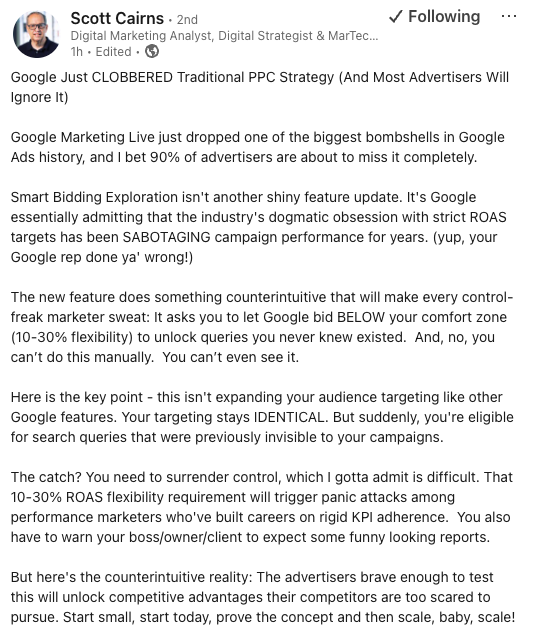
Of all the updates mentioned at GML, smart bidding exploration could be one of the most important for paid media marketers - we’ll be keeping a close eye on this over the coming months.
New “agentic” tools in Google Ads and Analytics
Google has rolled out a new breed of AI-powered tools for Ads and Analytics - dubbed “agentic,” which sounds suspiciously like something out of a sci-fi thriller. But instead of taking over the world (for now), these agents are focused on something far more dangerous: optimizing your ad campaigns.
Previously, AI within Google Ads and Analytics just nudged you with things like half-baked keyword ideas. Now, instead of suggesting, these ‘agents’ just do things - from building entire themed ad groups to generating creatives and real-time campaign troubleshooting.
…It’s the 24/7 do-it-all intern that marketing professionals have always dreamed of. Or is it?
What marketers are saying about 'agentic' ads tools:
In a post on PPCMastery, performance marketing expert Miles McNair made some valid points on the potential of AI agents, as well as the dangers of having Google as a single source of truth:

Navah Hopkins wrote a summary post (we’d recommend reading the whole thing) that mentioned there are still trust issues to overcome, and made the important point that many marketers (particularly in B2B and Lead Gen) don’t necessarily want AI agents to do things for them - they just want more granular levers they can pull themselves, rather than blindly trusting AI:

Of course, many are excited about the potential time savings AI agents could offer, especially those managing large accounts. Sashank Abbaraju mentioned the following in her post about GML:

Paid search expert Eric Frazzano echoed the sentiment, calling the agentic capabilities a “total game-changer to faster, smarter decision-making”:

Pankaj Zemse stated that we should start thinking of AI not just as a tool, but as a team member in his post:
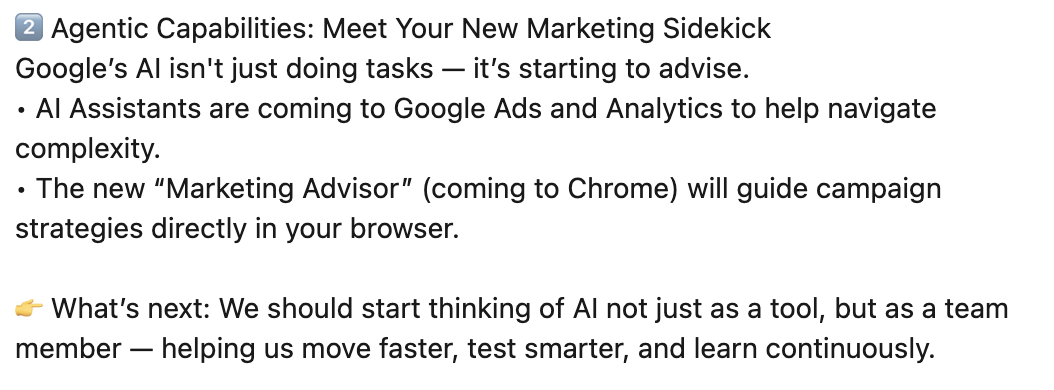
Of course, all this is theoretically great - provided your human team knows when to trust the machines and when to put them in their place. AI might be fast, accurate, and endlessly scalable, but it still doesn’t understand context, nuance, or brand tone the way marketers do. Yet.
Google’s new Marketing Advisor - an AI assistant built into Chrome
Congratulations on your newest hire - a PPC co-strategist.
Fortunately, it doesn’t demand a salary, or even any PTO for that matter. It comes in the form of Google’s Marketing Advisor, an AI assistant baked right into Chrome. It plugs into your Google Ads account and provides personalised insights, growth tips, and hands-on support - all within your browser tab.
It can flag issues (like missing conversion tags), suggest fixes, and even implement changes itself (with your go-ahead).
What marketers are saying about Google's Marketing Advisor:
As Shone Mahendran mentioned in his post, if it works well, this could replace years of learning how to optimize ads with one button:
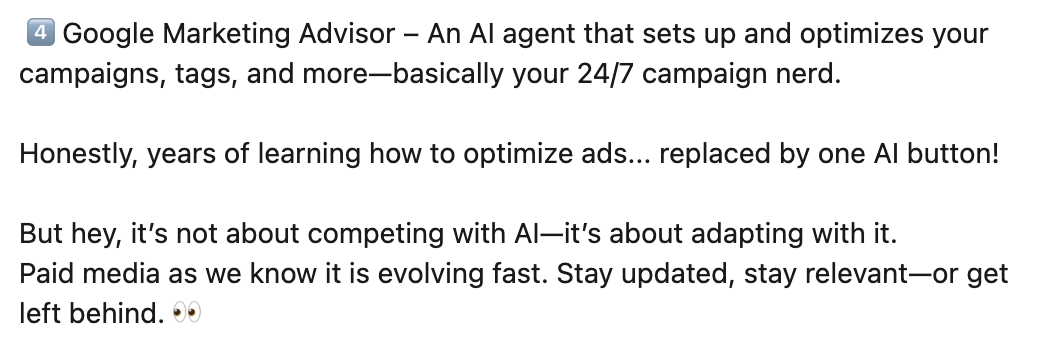
Andrew Nelson wrote that, with Google introducing features such as these, they’re entering a new phase where AI is omnipresent:
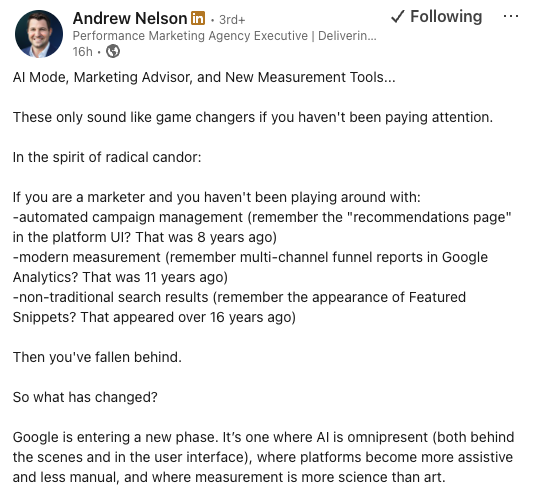
If this feature is as good as Google is promising, it could definitely lower the barrier to entry for PPC. It’ll be interesting to see how useful the AI assistant actually is.
Google’s Power Pack
Remember Google’s Power Pair? It was pushed hard at GML 2024 last year. We discussed the strategy with numerous PPC experts over the course of last year.
Well, it’s gone. Old news. Dead. This year, Google’s all about the ‘Power Pack’ instead. (Any bets on what it’ll be next year? The ‘Power Pile-on’, perhaps?)
So what is the Power Pack? Well, similar to the Power Pair, it’s not a new product. It’s a new way to use what we already have - Performance Max, Demand Gen, and Google’s shiny new AI Max for search campaigns (previously dubbed ‘Search Max’).
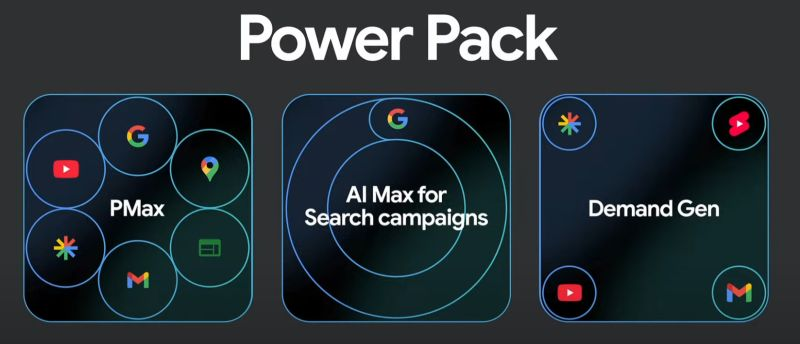
What marketers are saying about Google's Power Pack strategy:
Georgi Zayakov made a valid point - at least Google Reps won’t annoy us with constant talk of the ‘Power Pair’ anymore. It’ll be replaced with constant talk of the ‘Power Pack’ instead:
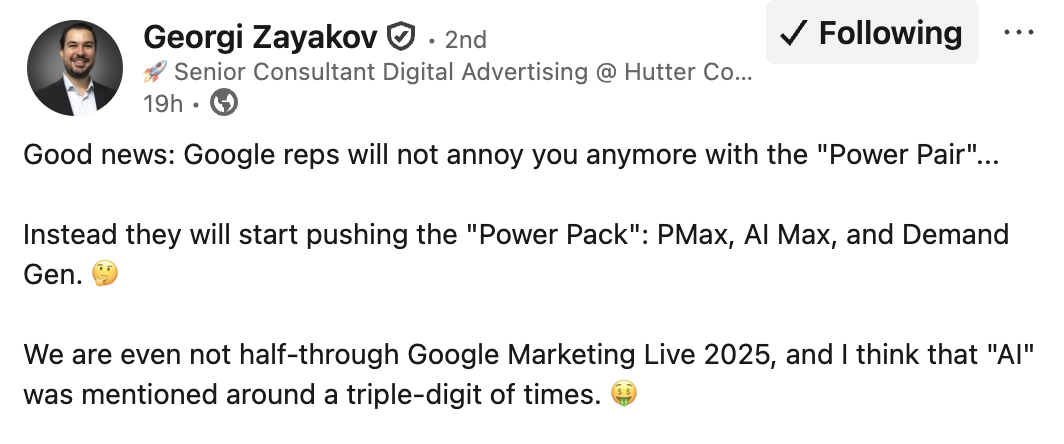
Honestly, we’re with Adriaan Dekker on this one:
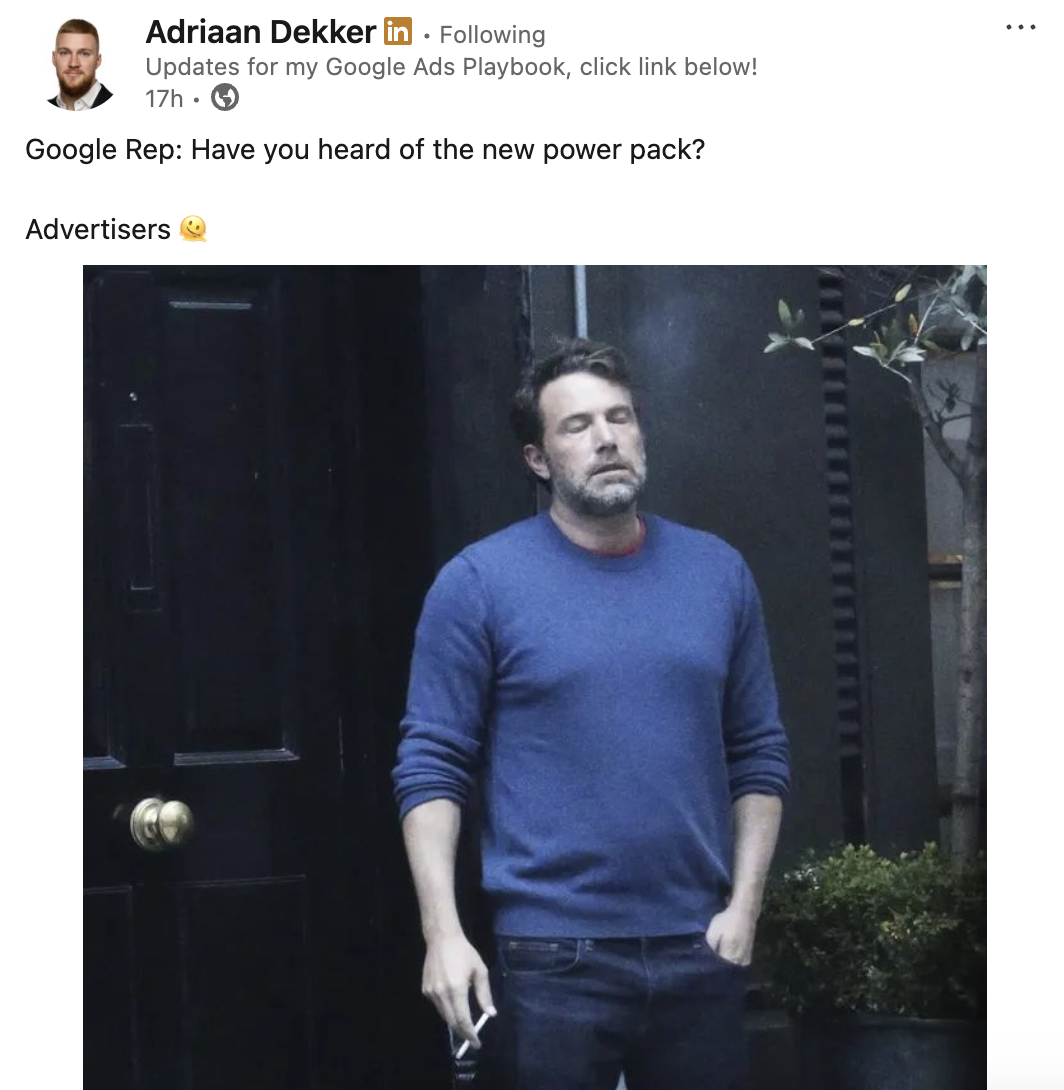
Still, the Power Pack has potential. We’ll definitely be speaking to performance marketers about this in the coming months in order to figure out whether it’s a genuine game changer, or - similar to the Power Pair - just another way for Google to remove visibility and push marketers further towards a keywordless future.
New marketing insight features: Tools for data, measurement, and testing
Google’s doubling down on privacy-safe performance tracking with a new set of tools built to show what’s actually driving results.
Incrementality testing is now easier and cheaper to run, so you can finally separate what’s moving the needle from what’s just making noise. And with beefed-up cross-channel analytics, you get a clearer picture of the full customer journey - not just last-clicks.
Then there’s Data Manager: a new tool to help you pull in first-party data from wherever it lives, stitch it together securely, and put it to work across your campaigns. Good stuff.
While this is an important update, there isn’t much discussion from the community here. At the end of the day, more options to gain insights, measurements, and analytics is universally considered a good thing - and as Arjun Bhatt puts it, ‘the goal is the same: make decisions faster, with more confidence.’

GML 2025: Final takeaways
According to Google, AI isn’t part of the strategy anymore - AI is the strategy. As Kirk Williams rightfully pointed out, ‘the Google AI machine took a little time to get rolling, but now the $2T slumbering bear has awakened’:
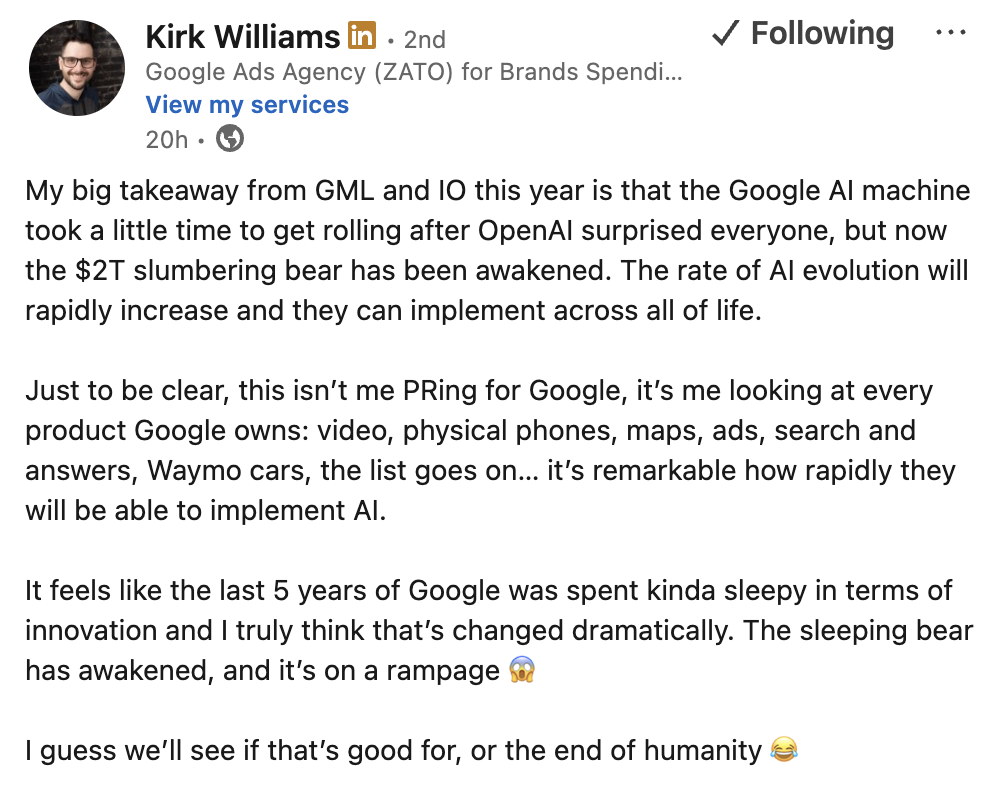
GML showed us that AI is, like it or not, the future of advertising. This means less manual setup, less manual work, and less manual insights - with automation taking the reigns in those areas.
However, this is likely to result in a greater need for human oversight to make sure it all runs in the right direction. Because while AI can optimise, scale, and experiment at speed, it still needs experienced marketers at the helm to keep performance aligned with business goals (and budgets).
So, whether you’re excited, sceptical, or somewhere in between, one thing’s certain: AI-powered ads are here to stay. And if you’re not already adapting, now’s the time to start.
Just make sure the robots don’t take all the credit.
Watch the full GML 2025 session here to get Google’s official take on everything mentioned above - plus updates on YouTube, Merchant Center, immersive video ad formats, creative AI, and more.



